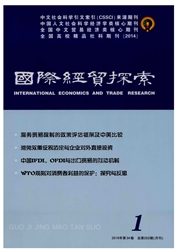

 中文摘要:
中文摘要:
根据2003。2012年煤炭和焦炭的国际贸易数据,采用社会网络分析方法,从贸易关系和贸易强度两个角度研究了这两种商品的贸易格局及其在样本期内的变化。分析显示,煤炭、焦炭贸易网络相对稳定但结构松散。当面对金融危机时。许多国家倾向于寻求更多的贸易伙伴以分散风险,但处于常态时则存在区域化发展的趋势。运用“核心-边缘结构模型”分别分析煤炭、焦炭贸易的无权网络和加权网络(以两国间贸易规模为权数),并将两种网络形成的核心区域进行交叉分析发现:核心国家可细分为绝对核心国家、强度型核心国家和关系型核心国家,各类核心国家整体稳定,但局部存在着规律性的变化趋势,且“关系结构”比“强度结构”更为稳定。金砖国家(巴西除外)和部分发达国家在核心区域中地位突出,但大部分贸易关系和贸易强度较大的国家为发达国家,发展中国家的重要性正在日益显现。根据结论可知,对煤炭和焦炭进行深加工处理是降低流通成本和拓展贸易范围的重要方法,营造公平的贸易环境对煤炭和焦炭贸易的健康发展格外重要。此外还应设法降低外部冲击可能给煤炭和焦炭贸易带来的负面影响。
 英文摘要:
英文摘要:
Using the international trade data of coal and coke from 2003 to 2012, this paper studies the sample period's trade pattems and changes in the two kinds of commodities from the perspective of trade relation and trade intensity with the method of social network analysis. It shows that the trade network of coal and coke is relatively stable but the structure is loose. When the financial crisis happens, many countries tend to seek more trade partners to reduce the risk, but the trend is regionalization when it is in the normal state. It also finds that the core countries can be divided into absolute core countries, intense core countries and relational core countries; all the core countries are basically stable, but there are some regular change trends in part of the network, and the structure constructed by trade relation is more stable than trade intensity. The BRIC countries (except Brazil) and some developed countries (such as Australia, Germany, United States, etc. ) have a prominent position in the core area, but most of the countries with greater trade relation and trade intensity are developed countries, but the developing countries are becoming important increasingly. Therefore, it is an important method to reduce the circulation cost and expand the scope of trade through the deep processing of coal and coke, and it is important to create a fair trade environment for the healthy development of coal and coke trade. In addition, it is necessary to try best to reduce the negative effect of extemal shocks on coal and coke trade.
 同期刊论文项目
同期刊论文项目
 同项目期刊论文
同项目期刊论文
 期刊信息
期刊信息
